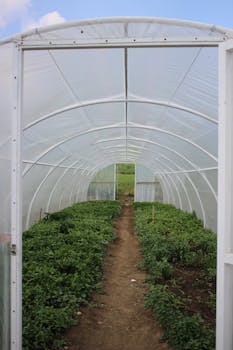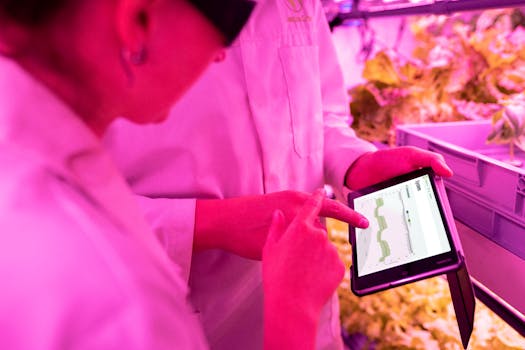The integration of technology in agriculture has become a transformative force, reshaping traditional farming practices. As the world grapples with the challenges of food security and sustainable farming, innovative technologies provide valuable solutions. Farmers today are leveraging tools that enhance productivity, efficiency, and sustainability across the agricultural landscape.
From precision agriculture to biotechnology, the deployment of modern technology is creating new paradigms in farming. This shift is essential to adapt to the growing demands for food, particularly in the United States. As climate change, population growth, and urbanization pressure agricultural systems, embracing technology represents a necessary evolution for future farming success.
In this article, we will explore the multifaceted role of technology in agriculture. We will examine various aspects, including precision farming, biotechnology, automation, and data analytics. Understanding these technological facets will help illuminate how agriculture is evolving to meet contemporary challenges efficiently.
Precision Farming: The Future of Agriculture
Precision farming is a revolutionary approach that utilizes technology to monitor and manage field variability. By employing GPS and IoT devices, farmers can optimize field inputs and agricultural outputs. This methodology leads to increased efficiency, as resources are used precisely where needed.
One of the significant benefits of precision farming is reduced waste. Farmers can apply fertilizers and pesticides only when and where necessary, cutting down on excess chemicals. Consequently, this method not only enhances crop yields but also promotes sustainability in farming.
Furthermore, precision farming allows farmers to collect vast amounts of data, which is pivotal for decision-making. By analyzing soil moisture levels, crop health, and weather conditions, farmers can make informed choices. This leads to better planning and improved crop management.
Using drones and satellite imagery, farmers can monitor field conditions in real-time. This technology provides farmers with insights that were previously impossible to obtain, directly impacting productivity. Overall, precision farming exemplifies how innovation is reshaping agriculture for the better.
As the agriculture sector increasingly adopts precision techniques, the results in terms of sustainability and productivity are promising. This approach not only meets the immediate needs of farmers but also addresses long-term environmental concerns.
Biotechnology: Enhancing Crop Resilience
Biotechnology plays a crucial role in enhancing crop resilience and productivity. Through techniques such as genetic modification, crops are engineered to withstand environmental stressors, including pests, diseases, and climate disruptions. Such advancements directly contribute to food security.
One notable example includes Bioengineered plants that require fewer resources while yielding higher outputs. These innovations support the farming community by minimizing the reliance on chemical interventions. Moreover, such crops naturally increase resistance to harsh conditions.
Moreover, biotechnology has led to developing nutritionally enhanced crops. By biofortifying staple foods, farmers can combat malnutrition effectively. These efforts show the potential of biotechnology to address global challenges beyond production alone.
Despite concerns about genetically modified organisms (GMOs), scientific consensus affirms their safety and benefits. Thus, biotechnology remains a vital area of research and development in agricultural practices. Farmers who utilize these technologies are often better positioned to succeed.
As research progresses, the applications of biotechnology will continue to expand. Consequently, its role in agriculture is expected to grow even more integral in meeting the needs of an ever-increasing global population.
Automation in Agriculture
The advent of automation in agriculture signifies another leap toward efficiency. Mechanized systems reduce the need for manual labor and improve precision during farming operations. This shift not only saves time but reduces overall operational costs.
Farm machinery equipped with AI and robotics can perform various tasks, such as planting, watering, and harvesting. These smart machines work tirelessly, providing farmers with a reliable support system. This capability enhances productivity, allowing farmers to focus on other critical areas.
Additionally, automated irrigation systems optimize resource usage by ensuring crops receive the right amount of water precisely when required. This reduces water waste, which is increasingly crucial in drought-prone areas. Consequently, automation promotes resource conservation.
With the continuous advancement of robotics and AI technologies, the potential applications are limitless. Farmers can expect to see enhanced capabilities that will make agriculture more efficient and sustainable. Overall, automation represents a significant stride in the evolution of farming.
The implications of automation on labor dynamics are noteworthy as well. While some jobs may be displaced, new opportunities emerge focused on technology management and maintenance, creating a skilled workforce for the future of agriculture.
Data Analytics: The Backbone of Smart Farming
Data analytics is swiftly becoming the backbone of modern agriculture. It allows farmers to harness data from various sources, including weather patterns, soil conditions, and crop performance. Through data analysis, farmers can make informed decisions that enhance productivity.
Implementing data analytics helps identify trends and predict outcomes related to cropping cycles. Such insights empower farmers to tailor practices to their specific conditions, optimizing yields. Thus, data-driven farming leads to more strategic resource allocation and improved returns.
Moreover, predictive analytics can help farmers anticipate potential issues before they escalate. By analyzing historical data and trends, farmers can prepare for droughts, fungal outbreaks, or pest invasions effectively. This proactive approach increases resilience in agricultural systems.
Integrating data analytics into farming operations also fosters collaboration between farmers and agronomists. These partnerships enhance the exchange of information, leading to innovative solutions and sustainable practices. In this context, technology and human expertise go hand-in-hand.
As more tools become available for data collection and analysis, the potential for growth in agriculture continues to expand. Farmers have the opportunity to unlock insights that can transform their operations and elevate productivity.
Sustainable Practices Enabled by Technology
Technology supports various sustainable farming practices, making agriculture more environmentally friendly. Techniques such as cover cropping and crop rotation can now be monitored and optimized through technology. This alignment helps in sustaining soil health and biodiversity.
Moreover, the development of smart sensors allows farmers to monitor environmental conditions continuously. This technology enables precise decision-making aimed at reducing the environmental footprint of farming practices. Farmers can minimize chemical usage based on real-time data.
Renewable energy technologies have also made significant inroads into agriculture. Solar panels and wind energy systems can power farming operations sustainably, reducing reliance on fossil fuels. By utilizing renewable energy, farmers contribute to a greener agricultural landscape.
Furthermore, technology facilitates transparency in supply chains. By utilizing blockchain and similar tools, consumers can track the origin of their food more accurately. This transparency promotes trust and encourages sustainable consumer choices.
As the agricultural sector continues to evolve towards sustainability, the role of technology remains critical. The collaboration between tech innovations and sustainable practices ensures a balanced approach to future farming challenges.
Challenges and Barriers to Adoption
Despite the numerous benefits of technology in agriculture, challenges remain in its widespread adoption. High upfront costs associated with modern technology can deter small-scale farmers from investing. As a result, these barriers often present risks in realizing technological benefits.
Additionally, there is a knowledge gap regarding the application of advanced technologies among traditional farmers. Many lack the necessary training to effectively implement these tools, which can lead to underutilization. Addressing these knowledge gaps is critical for successful adoption.
Infrastructure limitations also pose a significant barrier to technology adoption, particularly in rural areas. Reliable internet access and modern facilities are crucial for the successful implementation of many agricultural technologies. Without proper infrastructure, potential benefits may go untapped.
Furthermore, concerns regarding data privacy and ownership can hinder farmers’ willingness to adopt data-driven technologies. Clear guidelines and protections around data usage need to be established, ensuring farmers feel secure in sharing their information.
Ultimately, overcoming these challenges will require collaboration among stakeholders, policymakers, and agricultural businesses. By working together, it’s possible to create an inclusive environment for technology adoption across the agricultural sector.
Conclusion
In conclusion, technology plays an essential role in transforming agriculture into a more efficient, productive, and sustainable system. From precision farming to biotechnology and data analytics, innovations serve as pivotal tools in addressing global food security challenges.
As farmers embrace automation and sustainable practices, the agricultural landscape will continue to evolve. Overcoming barriers to technology adoption will be crucial in ensuring that all farmers can capitalize on these innovations.
As we look to the future, the collaboration between technology and farming will drive a new era of agricultural advancement. By harnessing these tools, farmers can build resilient systems that meet the demands of a growing population sustainably.
Ultimately, investing in technology for agriculture is an investment in the future of food security. With ongoing advancements, agriculture stands poised to thrive in an ever-changing world.
| Technology | Benefits | Challenges |
|---|---|---|
| Precision Farming | Increased efficiency, reduced waste, enhanced crop health | High initial costs, knowledge gaps |
| Biotechnology | Enhanced resilience, reduced chemical reliance | Public perception, regulatory hurdles |
| Automation | Labor saving, precise operations | Potential job displacement, skill gaps |
| Data Analytics | Informed decision-making, trend identification | Data privacy concerns, infrastructure issues |
| Sustainable Practices | Environmental conservation, resource optimization | Adoption costs, knowledge gaps |
- Greater efficiency in farming operations.
- Increased crop yields and quality.
- Reduction in waste and resource usage.
- Enhancement of food security through technology.
- Support for sustainable agricultural practices.


